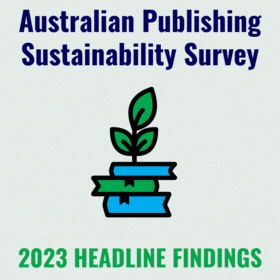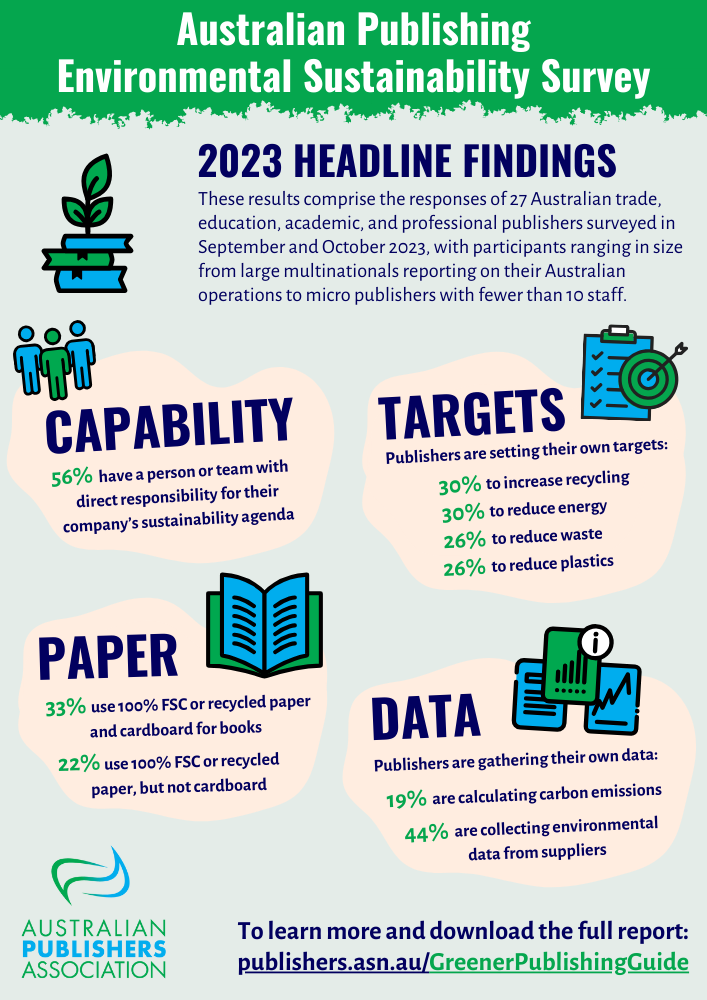
28/08/2024
The results for the inaugural APA Sustainability Survey have been released, with insights that will help the APA and our members improve the environmental sustainability of our industry.
The results show that many Australian publishers are taking steps to improve the environmental sustainability of their organisations. Over half of the publishers who responded have appointed a person or team to lead their company’s sustainability agenda, and over a quarter are setting targets to reduce energy, waste and plastic consumption, as well as to increase recycling. Unsurprisingly, given the complexity of the process, just 19% of respondents are currently calculating carbon emission for their Australian operations.
The survey also explored sustainability in the production, distribution and marketing of books, and identified several key areas where more publishers could be taking action right now. These include the use of 100% FSC paper and cardboard in book printing, and the reduction or elimination of glitter and foil.
A summary of the results can be found below along with recommendations for publishers, with the full report available to download here.

About the survey
The results comprise the responses of 27 Australian trade, education, academic, and professional publishers surveyed in September and October 2023, with participants ranging in size from large multinationals reporting on their Australian operations to micro publishers with fewer than 10 staff.
Industry sustainability surveys are underway in Europe and the UK, and the Australian responses will help us benchmark local engagement with sustainability against international counterparts.
Headline findings
Of the respondents, the survey found that:
-
56% have a person or team with direct responsibility for their company’s sustainability agenda
-
More than a quarter are setting targets to reduce energy (30%), waste (26%) and plastic consumption (26%), as well as increase recycling (30%).
-
19% are calculating carbon emissions for their Australian operations.
-
44% are collecting environmental data from suppliers.
-
56% require suppliers to have accreditation.
-
33% use 100% FSC or recycled paper and cardboard for book printing, while a further 22% use 100% FSC or recycled paper but not cardboard.
The survey also investigated:
-
Use of plastic (laminated covers, foil, spot varnishes, glitter) in book production
-
Transportation, returns and pulping
-
Use of hard copy promotional material
Five recommendations for publishers
The APA’s Sustainability Working Group has identified five key areas from the survey where publishers could be taking action immediately. These recommendations were highlighted by the working group for their impact and achievability, and will help guide industry progress over the next year, with improvements to be measured and reported on. These recommendations are:
-
Nominate and appropriately resource a staff member or a team in your organisation to be responsible for sustainability. Giving someone the time and resources to do this work can be the biggest driver for environmental change within an organisation.
-
Set up office recycling for paper, glass, soft and hard plastic, metal, batteries and e-waste. While this is the most widely adopted sustainability practice, some gaps in office recycling remain. Investigate how you can recycle each of these common office materials if you don’t currently.
-
Commit to 100% FSC or recycled stock for paper and cardboard in book printing. With paper a large contributor to the industry’s carbon footprint, commitment in this area can have a significant influence on a publisher’s overall environmental impact.
-
Reduce or eliminate the use of glitter and foil in book printing. Removing or reducing these cover embellishments will improve the ability to recycle books, and minimises the use of harmful microplastics such as those in glitter.
-
Only supply printed proof copies and point of sale materials to booksellers that have specifically ordered them. This will greatly reduce the amount of printed materials that need to be recycled – often unused – by booksellers.
UNSW Press CEO Kathy Bail, chair of the Sustainability Working Group, called on all publishers to get involved:
‘It’s important for publishers to make a start. With these recommendations, every publisher can identify some achievable wins. For instance, we know that appointing someone or a team in your organisation to look after sustainability can be a powerful driver for positive change.
All publishers who responded to our survey believe there are many areas where we can share experiences and improve our practices. Let’s get on with it and contribute actively to a global effort to make our books more environmentally sustainable.’
Next steps
Publishers have told us in the survey that they would like the APA to focus our efforts on sharing best practice across the supply chain. Publishers can already find a range of best-practice resources in our Greener Publishing Guide, which we will continue to update with new resources.
We will also be adding case studies to this guide to show how Australian publishers are taking practical steps to reduce their environmental impact.
If any publishers would like to join the APA’s Sustainability Working Group or share examples of their sustainability progress with other members, please get in touch with Andrea Hanke.